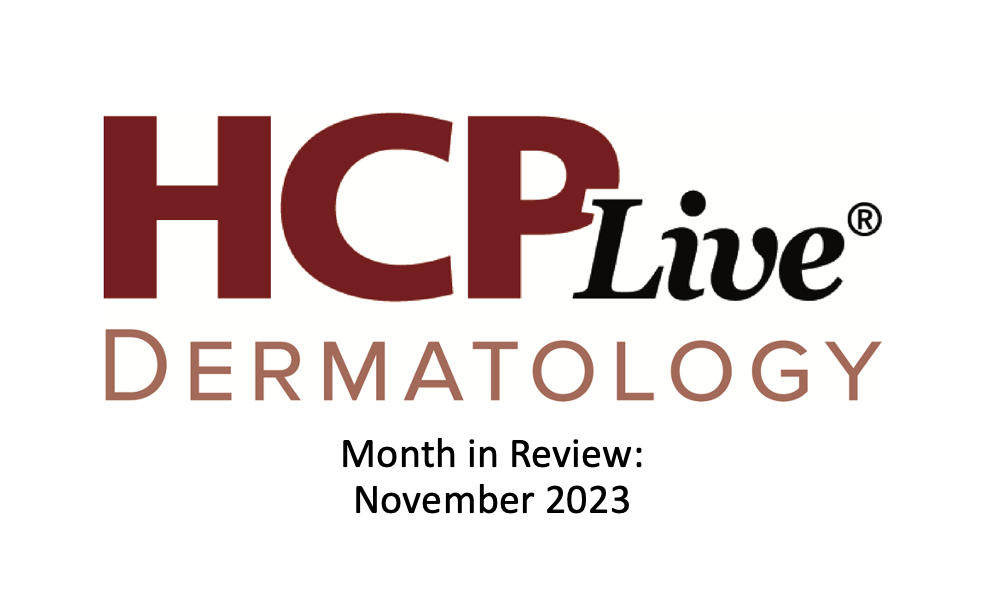News
Article
Dermatology Month in Review: November 2023
Author(s):
The Dermatology Month in Review for dermatology features 2 interviews, findings from recent long-term data, and a discussion of the FDA’s approval of secukinumab for HS.

As 2023 draws to a close, the field of dermatology has remained dynamic, with no indications of deceleration in these last couple of months.
November proved to be uniquely busy, with several interviews with key opinion leaders, responses to the approval of secukinumab, and new long-term data on several treatments. Here, the editorial team provides a summary of this month’s highlights in the dermatology field.
Reaction to FDA Approval of Secukinumab
What Does the FDA Approval of Secukinumab Mean for Patients with HS?
On the last day of October, the US Food and Drug Administration (FDA) approved secukinumab for the treatment of adult patients with moderate-to-severe hidradenitis suppurativa (HS). The approval was given to Novartis and represented the first indication for HS using a biologic that targets the interleukin 17A (IL-17A) pathway.
This particular drug class, recognized by experts, is noted as a promising approach in managing this chronic, systemic dermatologic disease. In early November, the editorial team spoke with Raj Chovatiya, MD, PhD, assistant professor of dermatology for Northwestern University’s Feinberg School of Medicine, about the approval.
“It's a pretty exciting day for those of us that see patients with hidradenitis, particularly those that require systemic therapy,” Chovatiya explained. “Just because it's been a good decade or so since we've actually had our last therapy that was available to us, which is adalimumab. It was, of course, a really important tool in the armamentarium for treatment.”
Reaction to Updates of Generalized Pustular Psoriasis Guidelines
Raj Chovatiya, MD, PhD: Reaction to Updated Guidelines for Generalized Pustular Psoriasis
In this story from November, Chovatiya was also interviewed by the HCPLive editorial team, describing his take on the updated consensus statement of the National Psoriasis Foundation’s Medical Board on standardized guidance for management of generalized pustular psoriasis (GPP).
“One of the statements that was generally in consensus with all the experts in this piece was the fact that GPP is life-threatening,” Chovatiya explained. “And we have to treat it as quickly as possible. I think that inherently, based on everything I just mentioned about the condition, it makes sense, given the fact that you can have some really unfortunate outcomes and individuals who aren't managed correctly.”
Chovatiya also noted that there was agreement around the notion that clinicians really should not be diagnosing this disease based on clinical features, given potential laboratory abnormalities related to inflammation and systemic symptoms.
“I think that is one where we can oftentimes cause a little bit of controversy because we tend to think so biopsy-forward in dermatology, especially if there are serious conditions, but just given how pressing it is for us to make this diagnosis and to administer treatment, you can really diagnose the disease quite well from just clinical signs,” he said.
New Questionnaire for Acne Treatment Satisfaction
DermSat-7 Questionnaire Tool Found to be Effective in Measuring Acne Treatment Satisfaction
Another notable study research found that the DermSat-7 questionnaire tool was shown to effectively measure treatment satisfaction among patients with acne. The study, led by Harvard Medical School assistant professor John S. Barbieri, MD, had been conducted to look at the questionnaire's performance in clinical practice settings.
The findings highlighted the internal consistency, structural validity, and construct validity of the tool. This investigation had been prompted by the recognition of treatment satisfaction as a key domain within the Acne Core Outcomes Research Network, with its effects impacting adherence and health outcomes.
4-Year Survival of Dupilumab for Atopic Dermatitis
Dupilumab for Eczema: Spotlighting 4-Year Survival Rate Data
A study which was also highlighted in November found that the overall probability of dupilumab survival for individuals with atopic dermatitis (AD) at the 4-year mark was shown to be around 80%. This new data resulted from a retrospective analysis that drew several informative conclusions, another of which being that the leading reasons for discontinuation of the treatment were inefficacy related to patients’ personal satisfaction.
“Strengths from the current study is that we analyzed the reasons of discontinuation by treatment period,” the investigators wrote. “Our study confirmed that the longer the dupilumab treatment period, the higher the rate of discontinuation due to discomfort with short interval between treatments requiring a visit the hospital every 2 weeks, or adverse events such as paradoxical facial erythema.”
The drug had previously been shown to be effective for long-term AD therapy, but the research team pointed out that those who terminate treatment do so for a variety of reasons. The team sought to expand existing knowledge on the motivators behind such decisions.
Long-Term Atopic Dermatitis Control with Ruxolitinib
Lawrence Eichenfield, MD: Long-Term Disease Control with Ruxolitinib Cream for Atopic Dermatitis
In another interview with the HCPLive editorial team, Lawrence Eichenfield, MD, UC San Diego School of Medicine professor of dermatology, spoke on recent findings about the long-term disease control of ruxolitinib cream in individuals with AD using the drug on an as-needed basis.
“I actually love this study and some of the data that was put together, sort of flushing out what it did,” Eichenfield explained. “We did a standard 8-week, twice-a-day, short term treatment with topical ruxolitinib, knowing that this topical JAK-inhibitor brings efficacy and good skin response.
Eichenfield noted that around 50% of the time, patients had gone off of the treatment due to the eczema becoming clear. Eichenfield stated that this was uniquely exciting, given that it demonstrated that the skin disease can be controlled without treating it all the time.




